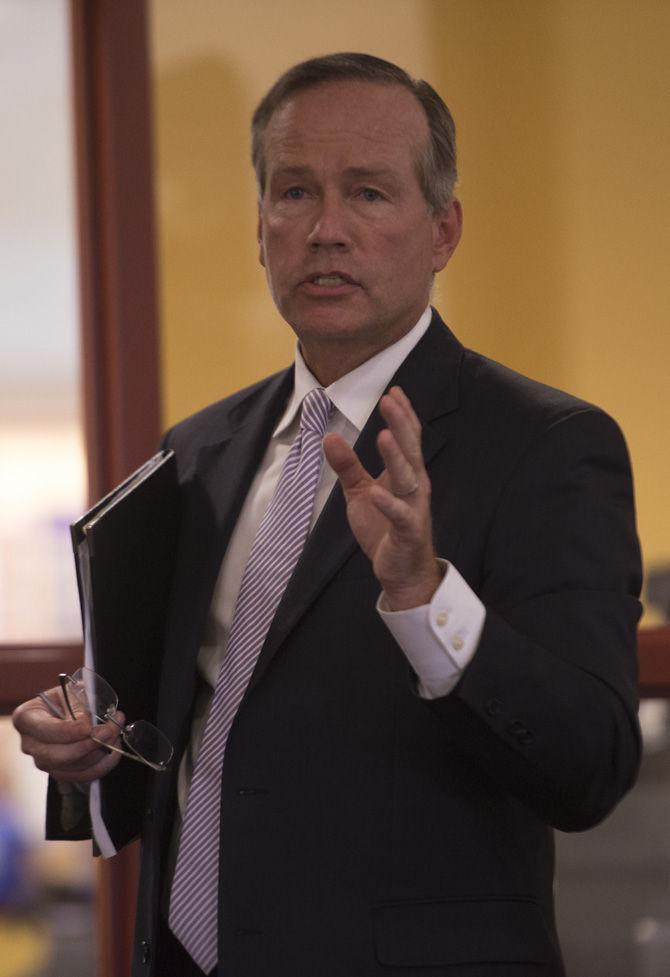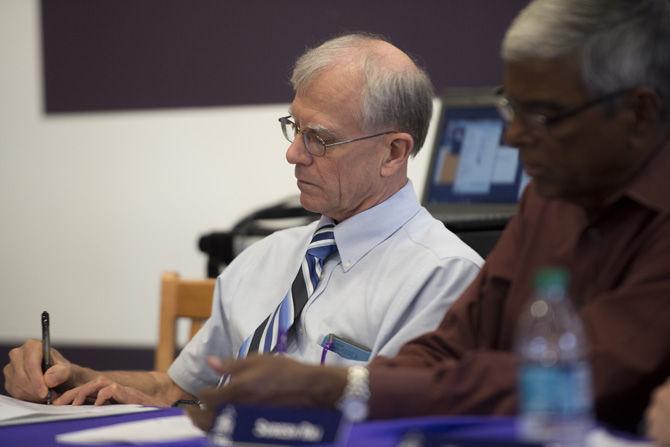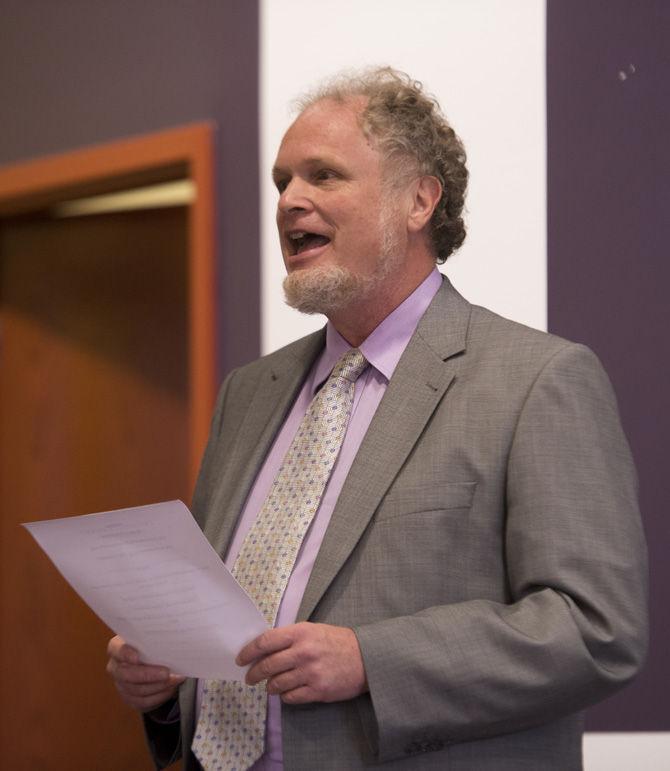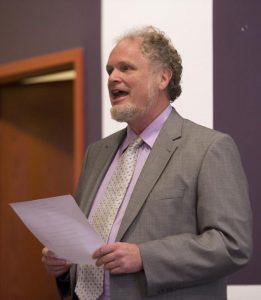In January 2018, the U.S. District Court for the middle district of Louisiana dismissed former University education professor Teresa Buchanan’s case that LSU President F. King Alexander and three University administrators violated her first and fourteenth amendment rights.
Alexander fired Buchanan in 2015, despite a panel of faculty members choosing not to recommend her dismissal when they found her guilty of violating the University’s sexual harassment policies.
Buchanan officially filed a notice to appeal the court’s decision on Feb. 1.
However, the Faculty Senate is not satisfied with the University’s decision and suggests that Buchanan’s right to due process was violated.
Despite the court’s initial motion for summary judgement, the LSU Faculty Senate and the American Association of University Professors have not reconsidered their respective censures of Alexander and the University.
PM-35
The University’s Faculty Senate was wary of the University’s Permanent Memorandum 35, which provides the guidelines for the LSU System faculty members. Also known as the Review of Faculty Ranks, it was initially presented for discussion at a senate meeting on Nov. 11, 1999.
According to a 2004 Faculty Senate Resolution titled, “Informing of developments regarding PM-35, Policy Statement 109, and related issues,” senators expressed unanimous disapproval of the memorandum. The acting senate of 1999-2000 declared the “periodic faculty performance reviews with dismissal-for cause” stipulated in PM-35 would “[weaken] the tenure-system.”
For three years following the implementation of PM-35, the Faculty Senate and University administrators argued over its use, according to the 2004 resolution. The faculty wanted to preserve the integrity of tenure and the administration did not want the process of dismissing an underperforming tenured professor to be “impossibly difficult.”
Due Process
Twelve years later, the Faculty Senate asserted that the administration failed to follow its own rules in reviewing faculty ranks as stipulated by PM-35 when firing Buchanan.
Alexander told The Daily Reveille that Buchanan could not use “tenure and/or academic freedom to abuse students and to harass students for years and years.”
According to the summary judgement, Buchanan never denied her students’ accusations against her. However, there is no evidence that the University informed Buchanan that her behavior was problematic prior to her dismissal.
“I wish the Faculty Senate would read the 79-page ruling,” Alexander said. “Because the judge basically said, which I worried about, ‘Why did the University take so long to do this?’”
In the Faculty Senate resolution to censure Alexander, the Faculty Senate wrote that the administrators forwent the remediation stipulated in the PS-109 process, which was designed to “salvage both the faculty member’s career and the University’s investment in long-serving faculty.”
PS-109 states that if a tenured faculty member’s job performance has been unsatisfactory for “two consecutive reviews or in three reviews in a five year period,” and that faculty member has not improved after receiving “adequate notice” and time to remediate, then the administration could pursue dismissal.
According to the summary judgement, the “years and years” of harassment did not show up in any of Buchanan’s annual reviews.
Before Buchanan was officially removed from the classroom for alleged sexual harassment, a Tenure and Promotion Committee unanimously recommended Buchanan be promoted to full professor, following a review process, according to the summary judgement in the case. This recommendation was rescinded in the midst of the investigation into her classroom behavior.
Buchanan had also secured $1.2 million in funding for several projects, including being the only faculty member in her department to receive National Science Foundation funding.
In March 2015, a committee composed of tenured faculty was appointed to conduct an investigation to find whether or not Buchanan violated University policy. Their initial hearing lasted 12 hours. Students testifying during the hearing were asked questions under oath like “How often does she use the f-word?”
Geology professor Brooks Ellwood was an external observer during the University’s investigation of Buchanan, and serves as the president of the University’s chapter of AAUP. Ellwood said that the students who were interviewed said Buchanan said the f-word “once or twice in a semester.”
Ellwood added that reports made it seem as if Buchanan cursed after every other word.
“The words she used, the one that is most egregious in the minds of the administration was the p-word,” Ellwood said. “And, of course, President [Donald] Trump uses the p-word in referring to a sexual assault against a person … whereas [Buchanan] didn’t use it that way.”
In her deposition, Buchanan said that her use of the “p-word” was a part of her pedagogy.
By using “salty language,” Buchanan said she was preparing her students for the tough language they may hear from parents once they began teaching at schools in different communities.
The committee decided Buchanan did violate the University’s sexual harassment policies, but they did not recommend her termination. The committee instead suggested Buchanan “modify her teaching methodology to correct offensive behavior.”
“The faculty committee came back with the wrong decision in that they said that they were convicting her of sexual harassment,” Ellwood said. “It was not sexual harassment … She was directing her comments to try to strengthen the students that were there.”
Ellwood said the language would more appropriately be considered verbal abuse instead of sexual harassment.
“It has worked in the past, that pedagogy, in that she has a stellar record,” Ellwood said.
Despite the faculty’s recommendation, Alexander proceeded in dismissing Buchanan.
Censure of Alexander and the University Kevin Cope, who was president of the Faculty Senate when it censured Alexander, described the administration’s decision as “nervous and indeed ultimately hostile.”
“Even if you are tried by a panel of your peers, as was the case with Dr. Buchanan, that can instantly be overturned by the sheer fiat of the president of the system,” Cope said.
On Oct. 6, 2015, the Faculty Senate passed a three-page resolution of censure stating Alexander and the University violated their own rules on faculty dismissal, ignored the recommendation of the faculty committee and compromised academic freedom and tenure.
Alexander said that Buchanan’s case was never about academic freedom, but said he “would hope that a number of the leaders in the academic senate also would see the support of our students as being vitally important, because I know our faculty do.”
Alexander said the LSU Student Government gave the administration a “resolution of support,” thanking them for their support and protection of students following their decision to dismiss Buchanan.
Cope said no member of the Faculty Senate in the past three years has suggested the censure resolution be repealed or rescinded.
“This whole process is part of infantilization –– the making of students into infants,” Cope said. “No matter what kind of saccharine facade it wants to put on this decision, the faculty does not buy it, does not accept it, and is not going to change its resolution.”
The University’s decision to dismiss Buchanan also caught the attention of the American Association of University Professors, an organization composed of college and university professors whose stated mission is “to advance academic freedom and shared governance.”
The University has been under AAUP censure since 2012, following an investigation into the 2006 firing of associate professor of engineering Ivor van Heerden and the 2010 firing of biology professor Dominique Homberger.
Alexander said that the AAUP’s decisions are not legally based, but based on the decisions of the organization’s leaders. He said the AAUP does not need to abide by state or federal laws, but should condemn the creation of hostile learning environments.
“This just shows that the LSU administration in defying the faculty judgement in the case of Teresa Buchanan has brought national shame on this institution,” Cope said.
Administrators’ Response
Three of the four defendants in Buchanan’s case against the University –– Damon Andrew, A.G. Monaco and Gaston Reinoso –– have declined interviews with The Daily Reveille.
Monaco indicated that he “never [provides] interviews to the media;” however, he prepared a statement on his thoughts:
“If the Faculty Senate continues to believe that the President deserves censure for the University’s appropriate actions in this case, I will still retain my admiration for the great majority of LSU’s faculty,” Monaco said in his statement. “I will, however, stand in full support of President Alexander. I expect that the majority of the students and taxpayers who we all serve will choose to stand in support of him, as well.”
When Alexander spoke with The Daily Reveille, he said that Buchanan’s case “was an issue of violating state and federal law and University policies,” not academic freedom.
Alexander said Buchanan’s dismissal showed students, faculty and staff that the University would not tolerate hostile learning environments and sexual harassment.
“I think the Faculty Senate should not ever support us violating the law,” Alexander said.
Faculty Senate president Kenneth McMillin said the implications of not publicly addressing sexual misconduct is evident at other universities.
“We’re starting to see what happens when you don’t publicly say, ‘No, we’re not going to accept this,’” McMillin said. “So, how can we fault our administrators?”
Though the Court has dismissed Buchanan’s case, the censure still stands.
“The Faculty Senate is an independent body and it does not alter its decisions or actions simply on the basis of a federal judge in a local district,” Cope said.
Buchanan’s Appeal
Buchanan officially filed a notice of appeal on Feb. 1. Her lawyers advised against her speaking with The Daily Reveille due to the ongoing legal proceedings.
Cope suggested that by having Judge Shelly D. Dick preside over Buchanan’s case, there was a potential conflict of interest.
“[Dick] has a record of not recusing herself from cases in which she has a conflict of interest,” Cope said. “She’s previously been involved with the LSU Law School, so this is hardly an objective judge.”
Dick received her juris doctor from the LSU Paul M. Hebert Law Center in 1988.
McMillin said a potential basis for appeal could lay in the fact that “educational, academic institutions don’t fit into the mainstream category of normal government and private entities,” therefore, freedom of speech could be interpreted differently in an academic setting.
“I don’t think this is the end of the Buchanan case by any stretch of the imagination,” Cope said.
Luke Jeanfreau contributed to this report.













